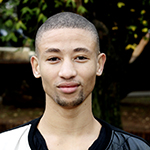
Reuben “R” Davids |
The votes have been counted, and we have a winner! After much excitement and a fairly close contest, Reuben “R” Davids emerged victorious from the top five contestants selected by our panel of judges. We chatted with the vibrant and enthusiastic Mr Davids to get a sense of the person who will be our Facebook ambassador for the next year.
What does the “R” stand for?
“Interestingly, some also know me as Vuyo. It's not a name on my birth certificate or anything; I just really like it. And I also coincidentally found out that it means “joy/happiness”, and I do enjoy being happy.”
What is your field of study, and how far along are you?
“I am pursuing a career in the economics field as a third-year BCom Accounting student in the Faculty of Economic and Management Sciences here at the University of the Free State.”
Are you originally from Bloemfontein?
“Yes, born and bred. I've been a Bloem Kid since day one.”
How is it that you ended up here, studying at the UFS?
“The UFS has always been one of my favourite universities. During my high school period, I was constantly exposed to people from my neighbourhood as well as schoolmates who performing excellently here at UFS, and it didn't go unnoticed. So I have always been drawn to the prestige that UFS carries.”
Which residence are you in, and what do you enjoy most about res life?
“I currently stay at home with the family, but for my first 2 years of study I resided at ConLaurês. What I enjoyed the most about res life is the freedom and independence that you get. It also enables one to participate in campus life much easier. It actually helps one grow and mature into the adult you're supposed to become with all the challenges and responsibilities that you're faced with.”
What do you hope to accomplish during your term as the #FaceOfFacebook?
“I enjoy the art of presenting (as well as being an MC), and being the #FaceOfFacebook will enable me to exercise that skill. Also, my interaction skills will be exercised. That being said, I would like to have those skills developed further by the end of my term as #FaceOfFacebook.”
What is your motivation in your studies, in taking part in this contest, and in life?
“I am an adrenaline junkie. I like taking on challenge; so what I normally do is I set a certain goal for myself and then take on the challenge to achieve that goal. That's my number one motivating factor. And I think I'm also inspired by the failures and successes of myself and of those around me.”
Reuben has already been featured in a #PeopleOfKovsies post on Facebook, and appeared in his first Facebook video covering the Open Day on our Bloemfontein Campus.